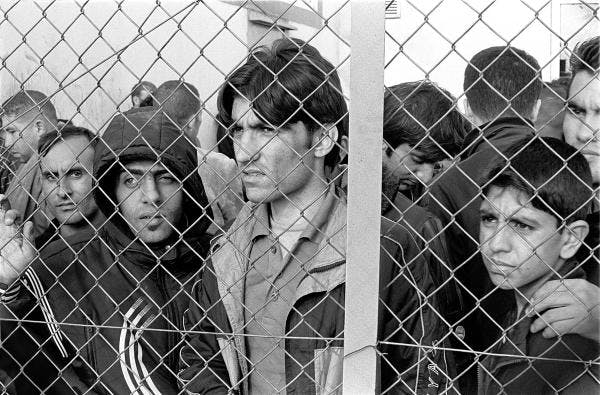Wikipedia - Ggia - CC BY-SA 3.0 - https://en.wikipedia.org/wiki/Immigration_detention#/media/File:20101009_Arrested_refugees_immigrants_in_Fylakio_detention_center_Thrace_Evros_Greece_restored.jpg
Towards a future without mandatory detention: A three-part series of dialogues with frontline and local leaders
What do the institutionalization of people with disabilities, forced treatment of people who use drugs, immigration detention, and the prison industrial complex have in common? They all sacrifice freedom and human rights in the name of public safety while having questionable positive impact on public safety. And as the pandemic upends societies around the world, officials are privileging punitive approaches to addressing public safety concerns over alternatives that focus more on health and human rights.
Many of the most vulnerable or marginalized people in the world right now are being held in unsafe conditions—in jails, prisons, immigration centers, and institutions where implementing social distancing measures is effectively impossible. However, despite calls from civil society organizations to slow or stop the influx of people into these facilities—and to free the most vulnerable—these practices have largely endured. Mandatory detention entails particularly harsh consequences for women and children, and its harmful effects on human dignity and social inclusion persist after release.
Between November 17 and 19, the Open Society Foundations and United Cities and Local Governments will convene three panels featuring 12 frontline activists who will discuss the rise of mandatory detention, assess the current situation, and explain how a world without mandatory detention would work to everyone’s benefit. This collective reflection aims ultimately at rethinking current approaches that have proved inefficient, bringing local, national, and international governments and institutions to an open discussion towards a community-led vision for 2045 that puts people, care, and social justice at the center.
Language interpretation will be provided in English, French, Portuguese, Russian, and Spanish for all three events.
Register for the event here
Panel One—Looking Back: The Origins and Drivers of Mandatory Detention
On November 17, 9–10:30 a.m. (EST), panelists and participants will examine the history of mandatory detention on a global scale and how it became such a prevalent practice. Questions discussed will include: How did white supremacy and colonialism contribute to the expansion of closed institutions and prisons across the globe? What are the main drivers of criminalization, incarceration, and institutionalization? What are the ways in which a carceral and punitive approach to public safety takes precedence over other approaches?
Speakers:
- Aryeh Neier (keynote speaker) is president emeritus of the Open Society Foundations.
- Kenya Cuevas is the founder and director of Casa de las Muñecas Tiresias.
- Jose Saldana is the executive director of Releasing Aging People in Prison.
- Deborah Coles is the executive director of Inquest.
- Lydia Kembabazi is the legal manager with AdvocAid.
- Deprose Muchena (moderator) is regional director with Amnesty International East and Southern Africa.
- Boukari Mamane (discussant) is the mayor of Agadez in Níger.
Panel Two—Taking Stock: Mandatory Detention Today
On November 18, 9–10:30 a.m. (EST), panelists will analyze the current state of mandatory detention: its overuse, the disproportionate impact it has on the poor and minorities, and the history of reform attempts that fell short. Additionally, larger questions about public safety will be raised, such as: Is the war on drugs working? Do highly punitive law and order policies make communities safer? And how has COVID-19 affected those in mandatory detention, as well as their communities?
Speakers:
- Jean Pierre Elong-Mbassi (#CitiesAreListening keynote speaker) is the secretary general of United Cities and Local Governments-Africa.
- Teresa Njoroge is the founder and director of Clean Start Solution.
- Youssef Madad is the director of Association Relais Prison-Société.
- Uju Agomoh is the executive director of Prisons Rehabilitation and Welfare Actions.
- Railda Alves is the founder and director of Amparar.
- Sarah Belal (moderator) is the founder and director of Justice Project Pakistan.
- Mohamed Ben Maouloud (discussant) is the deputy mayor of Gao in Mali.
Panel Three—Paving the Way Forward: Vision for 2045
Finally, on November 19, 9–11:00 a.m. (EST), panelists will outline a positive vision for 2045—one that reimagines public safety, health, and justice, invests in communities to ensure more equal societies, tackles the harms caused by the excessive use of mandatory detention, and strengthens community health and safety through transformative and restorative justice, deinstitutionalization, and community-based approaches to accountability and health.
Speakers:
- Emilia Saiz (#CitiesAreListening keynote speaker) is the secretary general of United Cities and Local Governments.
- Cathy Alvarez is an attorney with StreetLawPh.
- Oleksii Zagrebelnyi is the founder of FreeZone.
- Andrea James is the cofounder and director of the National Council for Incarcerated and Formerly Incarcerated Women and Girls.
- Jonathan Osei is the founder and executive director of the POS Foundation.
- Rosa Anaya (moderator) is the Second Chances program coordinator with Catholic Relief Services El Salvador.
- Juan Mendez (closing keynote speaker) was the UN special rapporteur on Torture and Other Cruel, Inhuman, and Degrading Treatment or Punishment from 2010 to 2016, and is a professor in residence of human rights law at the American University-Washington College of Law.
Regions
Related Profiles
- Open Society Foundations (OSF)
